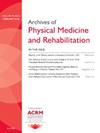Qualitative Examination of Chronic Care Needs of Individuals With Traumatic Brain Injury
IF 3.7
2区 医学
Q1 REHABILITATION
Archives of physical medicine and rehabilitation
Pub Date : 2025-10-01
DOI:10.1016/j.apmr.2025.06.012
引用次数: 0
Abstract
Objective
To examine the chronic care needs of patients with traumatic brain injury (TBI) and development of a Chronic Care Model for TBI.
Design
Focus groups to examine unmet needs, priorities for long-term support, and recommendations for chronic care management of TBI. We used thematic analysis to generate themes describing key concepts and synthesized needs to support chronic care management of TBI.
Setting
Brain injury support groups, community settings, and Zoom.
Participants
47 participants: people with chronic TBI (>6mo post-TBI; n=25), their family members (n=16), and TBI community service providers (n=6).
Interventions
Not applicable.
Main Outcome Measures
Not applicable.
Results
We found that people with TBI, their family members, and their providers are all unprepared to manage TBI as a chronic condition. Although participants identified numerous valuable services within their communities, there are extensive barriers to accessing them. There are also unmet needs for community and social participation, mental health, and family support.
Conclusions
To successfully implement a chronic care approach to TBI management, we must reduce the barriers to accessing services and resources for people with TBI. We must implement stronger initial brain injury education practices, develop structures to support the transition from health systems to community levels of care and provide sustained access to therapy services, family-caregiver support, and employment advocacy and support.
外伤性脑损伤患者慢性护理需求的定性分析。
目的:创伤性脑损伤(TBI)可能导致长期的健康并发症和残疾,导致人们呼吁将TBI作为一种慢性疾病来治疗。这种范式转变需要对长期创伤性脑损伤管理进行深思熟虑的重新构想。我们的目的是研究创伤性脑损伤患者的慢性护理需求,为创伤性脑损伤慢性护理模式的发展提供信息。设计:焦点小组调查未满足的需求,长期支持的优先事项,以及对创伤性脑损伤慢性护理管理的建议。我们使用主题分析来生成描述关键概念和综合需求的主题,以支持创伤性脑损伤的慢性护理管理。设置:脑损伤支持小组,社区设置和Zoom。参与者:慢性脑损伤患者(颅脑损伤后6个月;n=25)、家属(n=16)和TBI社区服务提供者(n=6)。干预措施:不适用。主要结局指标:不适用。结果:我们发现TBI患者、他们的家庭成员和他们的医生都没有准备好将TBI作为一种慢性疾病来管理。虽然与会者在其社区内确定了许多有价值的服务,但在获得这些服务方面存在广泛的障碍。在社区和社会参与、精神健康和家庭支持方面的需求也未得到满足。结论:为了成功实施创伤性脑损伤管理的慢性护理方法,我们必须减少创伤性脑损伤患者获得服务和资源的障碍。我们必须实施更强有力的初始脑损伤教育实践,制定结构以支持从卫生系统向社区一级护理的过渡,并提供持续的治疗服务、家庭照顾者支持以及就业宣传和支持。
本文章由计算机程序翻译,如有差异,请以英文原文为准。
求助全文
约1分钟内获得全文
求助全文
来源期刊
CiteScore
6.20
自引率
4.70%
发文量
495
审稿时长
38 days
期刊介绍:
The Archives of Physical Medicine and Rehabilitation publishes original, peer-reviewed research and clinical reports on important trends and developments in physical medicine and rehabilitation and related fields. This international journal brings researchers and clinicians authoritative information on the therapeutic utilization of physical, behavioral and pharmaceutical agents in providing comprehensive care for individuals with chronic illness and disabilities.
Archives began publication in 1920, publishes monthly, and is the official journal of the American Congress of Rehabilitation Medicine. Its papers are cited more often than any other rehabilitation journal.

 求助内容:
求助内容: 应助结果提醒方式:
应助结果提醒方式:


